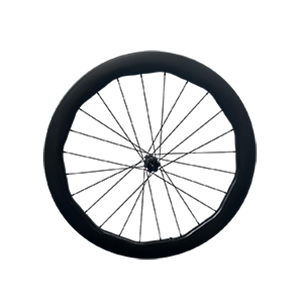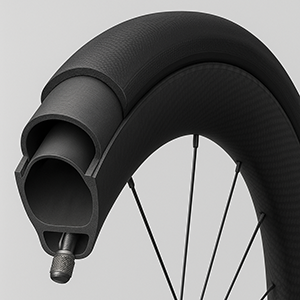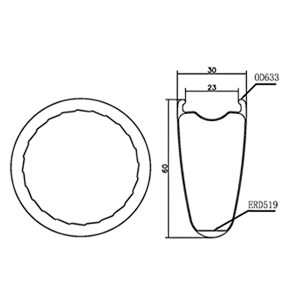
700c Carbon Wheels: The Ultimate Guide to Performance, Types, and Buying Tips in 2025
Bike components come in a dizzying array of standards, with new designs and specifications appearing almost every year. Yet one standard that has stood the test of time is the 700c wheel, a staple on nearly all road bikes and many hybrid models. Its enduring popularity comes from a combination of reliability, versatility, and compatibility, making it a go-to choice for riders of all levels. Knowing what makes a carbon fiber wheelset 700c different from other wheel sizes and materials helps you make smarter decisions when choosing components for your bike. In this guide, you’ll learn about their key benefits, types, how to choose the right set, and how to care for them.
700c carbon wheels are a type of bike wheel made with carbon fiber materials, primarily on road, gravel, and some hybrid bikes, known for their balance of speed, efficiency. Unlike regular wheels, carbon wheels offer better vibration damping, which can make long rides more comfortable.

The term “700c” refers to the diameter of the wheel. Here’s what you need to know:
Diameter: The rim measures roughly 622mm across, which is standard for modern road bikes.
Overall Size: With a tire mounted, the total wheel diameter is about 700mm, which is where the name comes from.
Understanding the size is important because it affects tire selection, frame fit, and overall bike performance.
What is C?
The “C” in 700c comes from a French system that categorized wheel diameters decades ago. It doesn’t directly refer to the width or exact diameter of the wheel, but it helps differentiate between different rim sizes in the same family.
700: Refers to the nominal outer diameter of the wheel in millimeters.
C: Denotes the rim type in the old French sizing system.
Key Benefits of Lightweight Carbon Wheelset 700c
700c carbon clincher wheelsets offer several advantages that make them a popular choice for road cyclists, racers, and enthusiasts looking to improve their bike’s performance. By understanding these benefits, you can see why many riders choose carbon over traditional materials.
Lightweight Design
One of the most noticeable benefits is their reduced weight. Carbon fiber is much lighter than aluminum, making it easier to accelerate and climb hills. The lighter wheels also improve your bike’s overall handling, giving you a more responsive ride.
Increased Stiffness and Power Transfer
Better Vibration Damping
Aerodynamic Advantages
Many 700c carbon wheels are designed with deeper rims to reduce wind resistance. This aerodynamic feature allows you to maintain higher speeds with less effort, giving you an edge whether you’re racing or training.
By choosing 700c carbon wheels, you enhance speed, comfort, and overall bike performance, making each ride feel noticeably better.
Different Types of 700c Carbon Wheels
Clincher wheels are the most common type of 700c carbon wheels. They use tires with an inner tube that hooks onto the rim. These wheels are easy to maintain, widely available, and compatible with most road bikes. If you want convenience and versatility, clincher wheels are a solid choice.
Tubular Wheels
Tubular wheels, sometimes called “sew-ups,” have tires that are glued directly to the rim. They are lighter and can offer better aerodynamics and stiffness compared to clinchers. Tubular wheels are popular among professional racers because they provide a smooth, fast ride, but they require more care and expertise to install.

Tubeless-Ready Wheels
Tubeless-ready wheels allow you to run tubeless tires, which means no inner tube is needed. This setup can reduce the risk of flats and improve ride comfort by allowing lower tire pressures. Tubeless carbon wheels are becoming increasingly popular for gravel riding and endurance road cycling.
Each type of 700c carbon wheel has unique advantages. Consider your riding style, the surfaces you ride on, and how much maintenance you’re willing to do when choosing the best option for your bike.
Carbon Fiber Bike Rims 700c Depth & Width Effects

How to Choose & Buy a Lightweight Carbon Wheelset 700c
Choosing the right 700c carbon wheels can feel overwhelming because of all the options available. By understanding key factors, you can find a set that fits your bike, riding style, and performance goals.
Not all 700c carbon wheels fit every bike.
Ensure the rim width matches your tire size.
Confirm the wheel is compatible with your brake type—rim or disc brakes.
Check axle type and spacing for proper installation.
Set a Budget
Carbon wheels vary in price depending on brand, rim depth, and technology. Decide how much you’re willing to invest while balancing performance and durability.
Additional Tips for Buying
Consider OEM or custom options if you want a personalized setup.
Compare different models for weight, stiffness, and aerodynamics.
Don’t forget maintenance and warranty options when making a decision.
By thinking carefully about your riding needs, bike compatibility, and budget, you can select 700c carbon wheels that enhance speed, comfort, and overall performance. Making the right choice ensures you enjoy every ride with confidence.
Comparing 700c Carbon Wheels vs Alloy Wheels
When choosing new wheels, it helps to understand the differences between 700c carbon wheels and traditional alloy wheels. The table below highlights key points so you can see which type fits your riding style and needs.
|
Feature |
700c Carbon Wheels |
Alloy Wheels |
|
Weight |
Lighter, making acceleration and climbing easier. |
Heavier, which can feel slower on hills. |
|
Stiffness & Power Transfer |
Stiffer, transferring more of your pedaling effort into speed. |
Less stiff, slightly less efficient power transfer. |
|
Vibration Damping |
Excellent at absorbing road vibrations for a smoother ride. |
Less effective, so bumps are more noticeable. |
|
Aerodynamics |
Can feature deep-section rims for better wind performance. |
Usually, shallower rims, less aerodynamic advantage. |
|
Durability |
Strong but can be damaged by severe impacts; requires careful handling. |
Very durable and can tolerate rough use better. |
|
Maintenance |
May require special care and inspection for cracks or wear. |
Easier to maintain; less sensitive to temperature and braking conditions. |
|
Price |
Typically more expensive due to material and technology. |
More affordable and widely available. |
What Is The Difference Between 700c and 650b Wheels?
When choosing wheels, you’ll often see two common options: 700c and 650 B. Both sizes have their strengths, and the choice depends on how and where you ride.
Weight & Performance Comparison
Carbon fiber wheelsets 700c are larger in diameter, which helps them roll more smoothly over long distances. They maintain speed well on flat roads and are often lighter when paired with narrow tires.
650b wheels, being smaller, accelerate faster and feel more agile. They can handle tighter turns and rougher terrain, but may not keep momentum as easily as 700c wheels.
Tire Compatibility
700c Wheels: Typically paired with narrower tires (23mm–32mm), making them ideal for road cycling and commuting.
650b Wheels: Fit wider tires (40mm+), which provide more grip and comfort on gravel, dirt, or mixed surfaces.
Recommended Use Cases
Choose 700c if your focus is road riding, racing, or covering long distances efficiently.
Choose 650B if you ride gravel, trails, or need extra stability with wider tires.
Understanding these differences helps you match your wheels to your riding style, so you get the most out of every ride.
Care and Maintenance of 700c Carbon Wheels
not only extends their lifespan but also keeps your rides safe and smooth. With just a few simple habits, you can prevent the most common issues.
Cleaning and Inspection
After rides, especially in wet or dusty conditions, wipe down the rims and hubs with a soft cloth. Avoid harsh cleaners that can weaken the carbon. Regularly check for cracks, chips, or unusual wear around the braking surface or spoke holes.
Tire and Brake Care
Make sure your tires are inflated to the recommended pressure.
If you use rim brakes, inspect brake pads often, as worn pads can damage the carbon surface.
For disc brakes, ensure the rotor bolts are tight and the rotors stay clean.
Storage and Handling
Store your wheels in a cool, dry place away from direct sunlight or extreme heat. When transporting your bike, use wheel bags or padding to prevent scratches or impact damage.
With consistent care, your 700c carbon wheels will stay reliable and ready for every ride.
Conclusion
700c carbon wheels offer a combination of light weight, stiffness, and comfort that can transform your cycling experience. By understanding their size, types, rim depth, and width, you can choose wheels that match your riding style and goals.
Whether you’re deciding between carbon and alloy, or comparing 700c to 650b, knowing the differences helps you make an informed choice. Proper care and maintenance will keep your wheels performing at their best, ride after ride.
Categories
New Blog
Copyright © 2026 Top-Fire Carbon Technology Co., Ltd. All Rights Reserved. Power by

IPv6 network supported